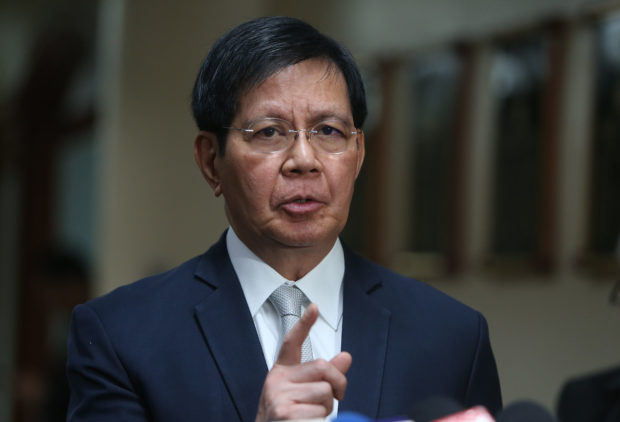
Senator Ping Lacson answers questions from the media in this photo taken in October 2021 in the Senate. INQUIRER file photo / EDWIN BACASMAS
MANILA, Philippines — By the time President Rodrigo Duterte steps down in June 2022, the country will be in hock to the tune of P13.42 trillion in local and foreign loans by June 2022, presidential aspirant Sen. Panfilo Lacson said on Saturday.
As it stood today, every Filipino, including newborns, is indebted by at least P120,000 with the country’s outstanding debt hitting P11.92 trillion at the end of September, Lacson said, citing figures from the Bureau of Treasury.
“If our debt is this big, each of us, even those born now, will be in debt by P120,000,” Lacson told supporters in an “online kumustahan” that he and his running mate, Senate President Vicente Sotto III, conducted on Friday with Pampanga voters.
The treasury released data on Friday showing that the country’s outstanding debt ballooned by 2.4 percent in September, from P11.64 trillion the previous month.
44% in 6 years
The Philippine government’s borrowings jumped 27.2 percent from P9.37 trillion a year ago, with the COVID-19 pandemic pushing higher government spending.
“We do not know when the pandemic will end. Second, because of the pandemic, our national debt has ballooned,” Lacson said.
The senator noted that while the country’s debt was at P5.9 trillion when the Duterte administration started in 2016, it is expected to swell to P13.42 trillion by June 30, 2022, or a 44-percent increase over six years.
Aside from the huge national debt, Lacson said the next President would also have to deal with peace and order and sovereignty issues in the West Philippine Sea, while the nation tried to recover from the pandemic.
Empower local governments
He reiterated his call to empower local governments around the country with enough funds for development projects as they take on more responsibilities as mandated by the Supreme Court.
Programs that may be better handled by the local governments include livelihood programs for drivers and senior citizens as well as improved distribution of cash aid that, he said, will empower families amid the pandemic.
Lacson has been pushing for more support to local governments through his Budget Reform Advocacy for Village Empowerment proposal.
“No one else knows the needs and priorities of [local governments] better than the local officials,” he said.